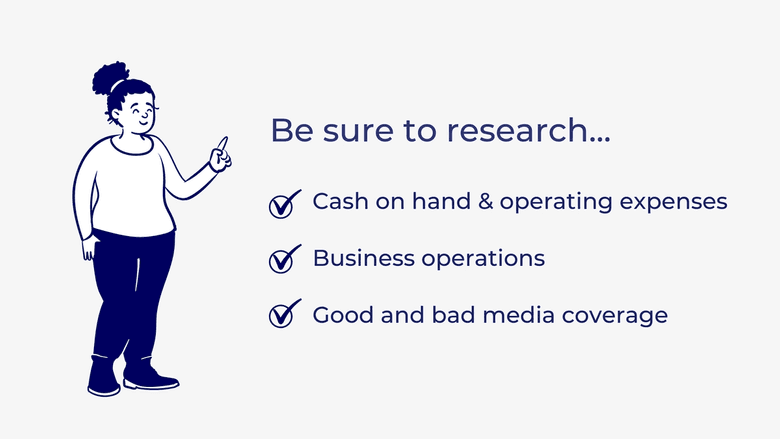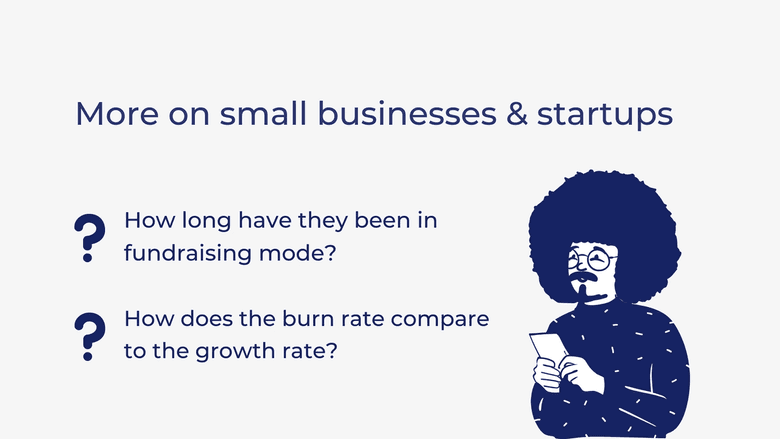Beware: Is Your Potential Employer in Trouble? Do Job Research to Find Out
Research tips that you should use BEFORE you take the job
Employers want candidates to be proactive in researching their company, so they don’t go into the interview clueless about the business.
Unfortunately, many job seekers skip out on company research and miss information they could’ve used to amaze interviewers.
More importantly, including the company’s financial status in your job research will save you from accepting offers from not-so-stable potential employers.
Here are a few tips on how to research jobs effectively and tell if your potential employer is in trouble.
Conducting Research on Publicly Traded & Large Private Companies

Check their Cash on Hand and Operating Expenses (OPEX)
Visit the company’s website to find their financial statements, such as their available funds, assets, and operating expenses. Dropbox (stock code DBX), for instance, publishes their quarterly earnings, annual reports, and new partnerships on their investor relations page.
Private companies, on the other hand, are under no obligation to show people their financial records, unless they issue bonds. However, many private companies file reports to the Securities and Exchange Commission (SEC) that you can look-up using SEC’s EDGAR database or AnnualReports.com.
Reading through those SEC filings can take time, and you may need some technical background to understand what many of these reports mean. So, if you can’t find anything that makes sense there, try the next tip...
Learn about their Business Operations
Find out as much as you can about the company, including:
- How they earn: direct sales, affiliates, ecommerce, retail, B2B
- Who buys their products and how big is their demographic?
- What are they selling and how much is it?
- What are the profit margins on their offers?
- How long have they been in business?
Analyze the information you find. Businesses with big profit margins, in general, can pay higher wages because they have more breathing room in their operating expenses. New businesses, on the other hand, may not be as stable as those with several decades under their belt.
Most of this information can easily be found with a quick Google search of the company’s name. Some of them you’ll find directly on their website, others you’ll find through articles or business lists.
The following resources will aid in your job research:
These lists are often arranged by the publication’s ranking criteria, but you can filter them based on location and industry.
Scan the Media for Good and Bad News
A company website will only show you one side of the story—the rosy version. Go beyond that and read what unbiased publications and social media have to say about them.
Scan for major company changes in the past year. Note important events like layoffs, mergers or acquisitions, new leadership, or new product launches. Changes like these can bring new opportunities but it can also spell disaster for new employees. An acquisition, for example, can translate to better stock value but some employees might be let go as a result of redundancy.
This is where Google’s news search function and press release aggregators can work wonders. These tools are said to be a reporter’s best friend, but they can be yours, too.
Just search “Company Name” + “news” and filter the results to the past year on Google. You can also do this on LinkedIn and other social media sites.
For press release aggregators, try PR Newswire, Tech URLs, or AllTop tech.
Conducting Research on Small Businesses & Startups

Penny Kim moved across the country to join WrkRiot in 2016, a Silicon Valley startup that aimed to improve the job search process using machine learning.
After weeks of delayed pay, employees received an edited image of what founders claimed to be wire transfers for their salary. A few days later, the company officially went kaput and its CEO was charged with fraud. It turns out the funds never existed.
Despite horror stories like this, many job seekers are enticed by the prospect of joining a startup because of the chance to join a company in its groundbreaking days. Just imagine, what if you were one of the 10 employees to build the next Facebook?
Hopeful dreams and potential IPOs aside, you should conduct a background check on potential employers you want to join.
This will be a slightly more challenging research project-- you may not be able to get annual reports and financial information similar to those of big companies, but you can ask questions that will reveal the organization’s financial stability and marketability.
Where to start...
1. Consult Your Network
Ask people you know for inside scoop on the company. If you’re a recent college graduate with no network yet, ask your college or university alumni system if they can connect you with someone from the company.
2. Review Local Publications
Check local news publications, trade journals, and business journals for write ups about the company. Try these resources:
- Local business journals (a list from Wikipedia)
- Business Journals Directory (a directory of journals in 43 major cities)
3. Reach out to the Local Chamber of Commerce
Visit the USA Chamber of Commerce for a list of chamber organizations in your area. You don’t need to be a member to ask questions or search their website’s directory.
Most of the businesses who sign up for a membership do so for the benefit of networking and getting potential customers from the local area, which isn’t always useful for tech companies. If that’s the case for your potential employers, try searching for complaints or scams about them on the Better Business Bureau instead.
Signs a Small Business or Startup is in Trouble

Always in Fundraising Mode
Companies stuck in fundraising mode have trouble raising funds because they can’t convince investors of their idea.
A typical seed round can take about two months, while a Series A can take as much as five months. If an employer tells you they’ve been at it for eight months, that’s a bit suspicious.
Burn Rate Outpaces Growth
Whether it’s a startup or a small business, the goal is still to earn more than they spend.
They may need to spend money at first to acquire customers. But if that spending isn’t soon matched with growth, the company will soon need an additional influx of funds to keep afloat.
It’s true that some startups need a longer runway to succeed. That’s not an excuse to assume a company is stable and just in the process of ramping up.
Ask In-Depth Questions During the Interview
Interviewers expect you to ask questions during the interview. It shows you’re enthusiastic about the company and that you’re not just like other passive applicants who will take any opportunity.
Questions to ask:
- How much money do you need to break even?
- How much are you spending to acquire one customer?
- Do you have a process in place to acquire new customers?
- What’s the average lifetime value of a customer?
- What’s the typical turnover rate for said customers?
In Conclusion: Don't Ignore Red Flags
You know what they say: if it’s too good to be true, it probably is. Don’t ignore red flags you uncover about a company during your job search. Even if they give you a good offer, it won’t be worth much if they let you go in a few months.
Always check social media, annual reports, press releases, and all the resources mentioned here when vetting potential employers before negotiating your salary or accepting a job offer.
The information provided herein is for general informational purposes only and is not intended to provide tax, legal, or investment advice and should not be construed as an offer to sell, a solicitation of an offer to buy, or a recommendation of any security by Candor, its employees and affiliates, or any third-party. Any expressions of opinion or assumptions are for illustrative purposes only and are subject to change without notice. Past performance is not a guarantee of future results and the opinions presented herein should not be viewed as an indicator of future performance. Investing in securities involves risk. Loss of principal is possible.
Third-party data has been obtained from sources we believe to be reliable; however, its accuracy, completeness, or reliability cannot be guaranteed. Candor does not receive compensation to promote or discuss any particular Company; however, Candor, its employees and affiliates, and/or its clients may hold positions in securities of the Companies discussed.
